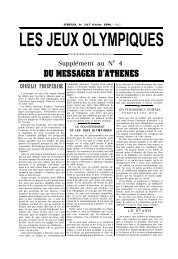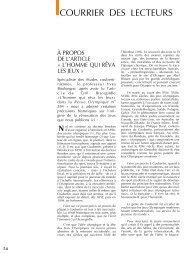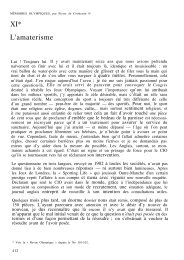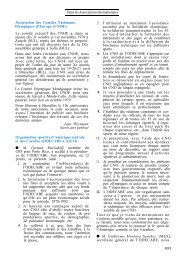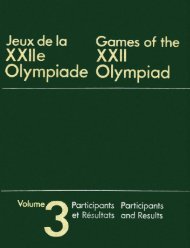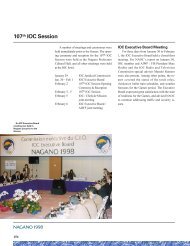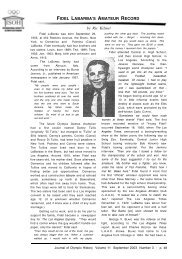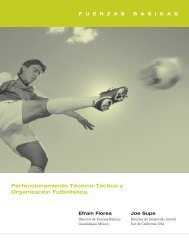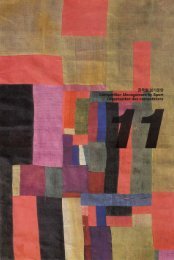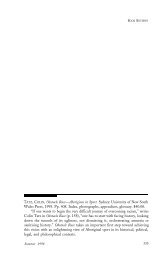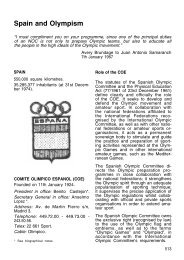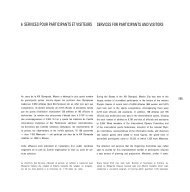Sport Development and Mexican Nationalism - LA84 Foundation
Sport Development and Mexican Nationalism - LA84 Foundation
Sport Development and Mexican Nationalism - LA84 Foundation
You also want an ePaper? Increase the reach of your titles
YUMPU automatically turns print PDFs into web optimized ePapers that Google loves.
Journal of <strong>Sport</strong> History, Vol. 18, No. 3 (Winter, 1991)<br />
revitalized Mexico that hosted the 1968 Olympic Games. 6 Sociologist Norman<br />
Hayner similarly concluded that the Revolution gave <strong>Mexican</strong>s more personal<br />
freedom, one outlet for which was play. The result, he believed, was a shift from<br />
a small number of members or participants at private clubs to larger numbers of<br />
players usually under public sponsorship. At the same time, the mix of recreational<br />
activities had changed, with traditional forms giving way to mostly<br />
imported, commercialized varieties in more urbanized settings. 7 In one sense,<br />
despite the Revolution, the Porfirians—or at least their values-won after all,<br />
in that they chose the fields on which future games were to be played.<br />
Without debating the assertions of Tannenbaum <strong>and</strong> Hayner, this essay<br />
focuses on an analysis of the place of sport in Mexico in the half century after<br />
the end of the Revolution’s most violent years by looking at three dimensions of<br />
what might be called “official” sports policy: the domestic promotion of sports<br />
<strong>and</strong> physical education; the sponsorship of <strong>Mexican</strong> participation in international<br />
sporting events in foreign countries; <strong>and</strong>, the hosting of international<br />
sporting events on <strong>Mexican</strong> soil. In each case, it considers, however tentatively,<br />
motives, methods, <strong>and</strong> results, looking most specifically at the interrelated<br />
questions of national integration <strong>and</strong> national identity. 8 Finally, it comments<br />
briefly on how the <strong>Mexican</strong> experience compares with that of other Latin<br />
American countries.<br />
Identity <strong>and</strong> Change: The 1920s <strong>and</strong> 1930s<br />
In the 1920s, there is evidence that some (but not many) government officials<br />
saw in popular sports <strong>and</strong> physical education appropriate tools for political<br />
mobilization <strong>and</strong> social development. 9 More so they contemplated in sports a<br />
mechanism for reestablishing <strong>Mexican</strong> credibility in the international community.<br />
Also among politicos <strong>and</strong> some educators was a preoccupation with<br />
cultural nationalism, but this was rarely linked to sports directly. Even a<br />
bilingual attempt in 1926 to publicize the long-distance running abilities of the<br />
Tarahumara Indians had the dual objectives of having such endurance races (of<br />
around 100 kilometers) included in the 1928 Olympics <strong>and</strong> of obliging “the<br />
6. Frank Tannenbaum, “Del juego y su significación social: reflexiones sobre los juegos olímpicos en<br />
Mexico,” in Antonio Alatoree, et al., Extremos de Mexico. Homenaje a don Daniel Casío Villegas (Mexico, D.F.:<br />
El Colegio de Mexico, 1971), pp. 501-510.<br />
7. Norman S. Hayner, New Patterns in Old Mexico: A Study of Town <strong>and</strong> Metropolis (New Haven: College &<br />
University Press, 1966). Some of the same material appears in Hayner’s earlier “<strong>Mexican</strong>s at Play-A Revolution,”<br />
Sociology <strong>and</strong> Social Research 38 (November-December 1953); 80-83.<br />
8. Anthony H. Richmond offers a most helpful discussion of the differences between ethnic <strong>and</strong> other types of<br />
nationalism <strong>and</strong> of the relationship between nationalism <strong>and</strong> political <strong>and</strong> social action; see his “Ethnic<br />
<strong>Nationalism</strong>: Social Science Paradigms,” International Social Science Journal 111 (February 1987): 3-18. It<br />
seems clear that Mexico lacks a true ethnic nationalism <strong>and</strong> has struggled to create instead a sense of nationalism<br />
based on geographic proximity <strong>and</strong> shared historical experience. James H. Frey provides a more general<br />
discussion of the various potential links between sport <strong>and</strong> development in “The Internal <strong>and</strong> External Role of<br />
<strong>Sport</strong> in National <strong>Development</strong>,” Journal of National <strong>Development</strong> 1 (Winter 1988): 65-82.<br />
9. In the Yucatan, at least, some regional Revolutionaries appreciated the potential which sport (in particular,<br />
baseball) offered for actively mobilizing the lower classes. See Joseph, “Forging the Regional Pastime”; Gilbert<br />
M. Joseph <strong>and</strong> Allen Wells, “The Rough-<strong>and</strong>-Tumble Career of Pedro Crespo, ” in The Human Tradition in Latin<br />
America: The Twentieth Century, ed. William H. Beezley <strong>and</strong> Judith Ewell (Wilmington, DE: Scholarly<br />
Resources Inc., 1987), pp. 27-40; <strong>and</strong> Gilbert M. Joseph, “Documenting a Regional Pastime: Baseball in<br />
Yucatan,” in Windows on Latin America: Underst<strong>and</strong>ing Society Through Photographs, ed. Robert M. Levine<br />
(Coral Gables: North-South Center, University of Miami, 1987), pp. 77-89.<br />
352



